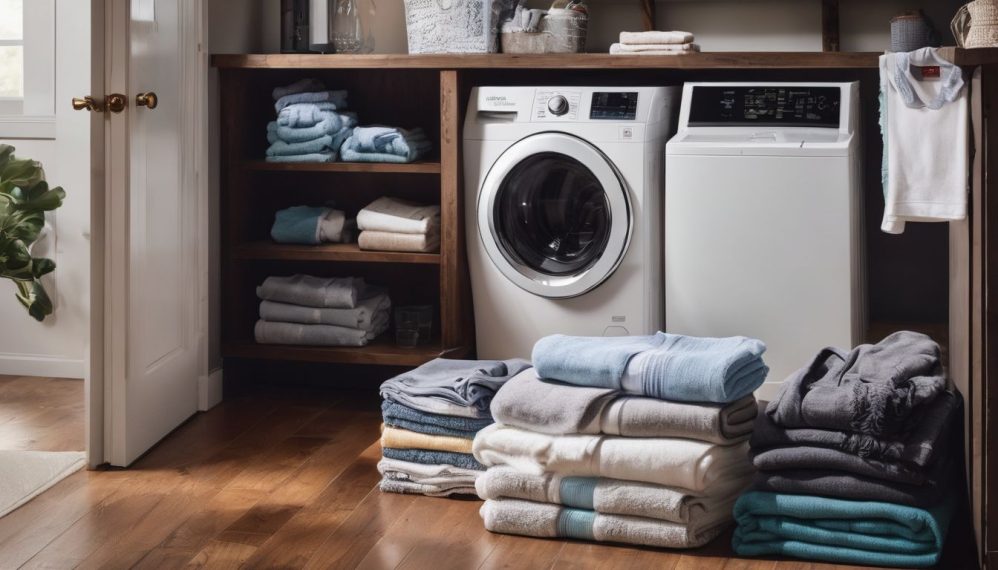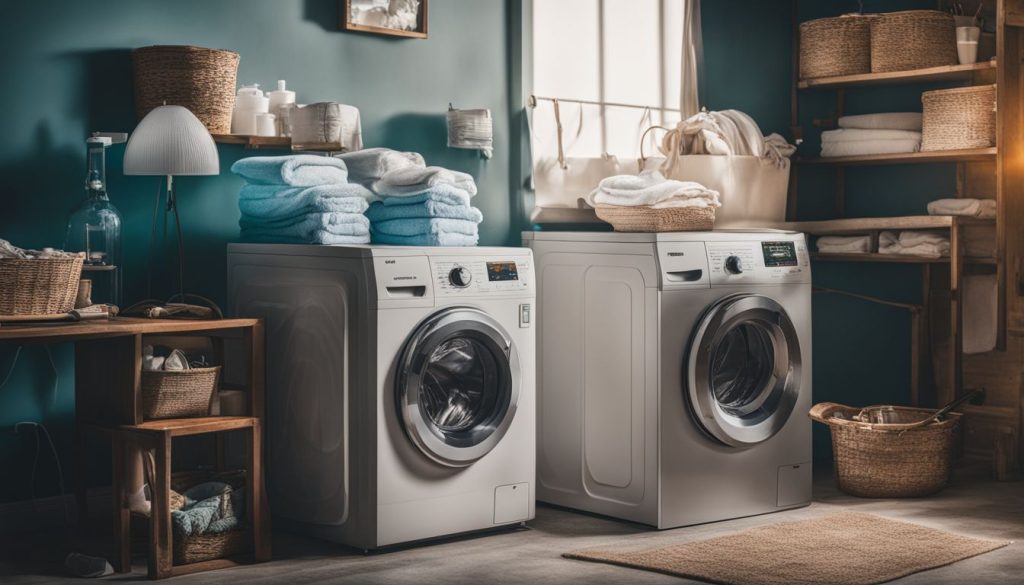
Ever wonder if it’s cheaper to do laundry at home or hit the laundromat? On average, a single load of laundry at home can cost around $1.50 to $2.00. This article breaks down the expenses so you can decide what’s best for your budget.
Don’t miss out on savvy savings tips ahead!
Key Takeaways
- The average cost of doing laundry at home, considering electricity, water usage, and laundry supplies, amounts to approximately $1.37 per load.
- By adopting energy-saving techniques like using cold water for washing and air-drying clothes when possible, homeowners can effectively reduce the cost of doing laundry at home while also contributing to sustainable practices.
- When comparing costs between doing laundry at home and a laundromat, taking care of laundering needs in-house presents an economical choice compared to visiting a laundromat regularly due to reduced energy consumption and water usage when using modern, energy-efficient washing machines.
- Consideration should be given not only to the cost per load but also factors like convenience, availability of laundromats in your area, size and type of laundry load you typically have, overall cost-effectiveness including any additional expenses such as transportation or maintenance of your own washer and dryer.
Factors Affecting the Cost of Doing Laundry
Electricity consumption and water usage are the main factors affecting the cost of doing laundry at home, along with the cost of laundry supplies.
Electricity consumption
Washing machines and dryers are major players in your home’s energy usage, particularly when it comes to laundry day. Operating these appliances can cost around $10 monthly on your electricity bill, adding up to about $120 each year.
Your washer and dryer’s power consumption depends a lot on the settings you choose; for instance, selecting hot water for washing and warm rinsing consumes an average of 4.5 kWh per load.
At a standard rate of $0.15 per kWh, that adds up to 68 cents every time you run the machine.
Choosing an energy-efficient laundry routine isn’t just good for the environment—it also makes sense for your wallet. If budget-friendly alternatives intrigue you, consider using natural gas instead of electricity for heating water in your washing cycles or invest in an efficient washerdryer combo that slashes those energy bills significantly while still keeping your clothes clean and fresh.
Water usage
Water usage can be one of the most significant costs when doing laundry at home. The average washing machine guzzles about 41 gallons per load, making water rates a crucial factor in your overall laundry expenses.
If you wash clothes four times a week, this translates to thousands of gallons annually, and based on local water rates, it could add up to over two hundred dollars each year just for water.
Cutting down on water consumption is both eco-friendly and cost-effective. By opting for high-efficiency machines that use less water or tweaking your laundry habits, like using appropriate load settings and only washing full loads, you reduce domestic water usage considerably.
This not only lowers home laundry costs but also supports broader efforts towards water conservation without sacrificing clean clothes.
Cost of laundry supplies
The price of washing detergent plays a significant role in the expenses for doing laundry. With costs for a single load ranging between $0.15 to $0.40, choosing the right detergent can make a difference in your wallet over time.
Liquid, powder, or pod detergents each come with different price points and efficiency levels.
Other supplies such as fabric softener, bleach, and stain removers add to the cost of laundry per load but offer benefits like longer-lasting clothes and better cleaning power. Buying these items in bulk or opting for store brands can save money without compromising on quality.
It’s not just about how much you use, but also finding the best deals that work for your budget and laundry habits.
Comparing Laundry Costs at Home and at a Laundromat
The cost per load at home includes electricity, water, and laundry supplies. The cost per load at a laundromat may vary based on location and size of the machine. Factors to consider when choosing between home laundry and a laundromat include convenience, time saved, and overall expenses.
Cost per load at home
At home, the cost per load of laundry is approximately $1.37, making it a budget-friendly option compared to using a laundromat. Factors contributing to this lower cost include reduced energy consumption and water usage when using modern, energy-efficient washing machines.
Choosing cost-effective laundry supplies can further minimize expenses for each load.
When budgeting for laundry expenses, considering the average annual cost of doing laundry at home – about $264.16 for four loads per week – it becomes evident that taking care of laundering needs in-house presents an economical choice compared to visiting a laundromat regularly.
Cost per load at a laundromat
The cost per load at a laundromat typically ranges between $2 and $4, depending on the location and amenities offered. In addition to this base rate, there are additional charges for using the dryer.
On average, when factoring in both washing machine and dryer fees, the total cost per load at a laundromat is approximately $3.12, making it crucial to consider these expenses when planning your laundry budget.
It’s important to note that recent data indicates an increase in the average cost of doing laundry at a laundromat from around $2 to now approximately $3. This rise should be taken into account when comparing home laundry costs with those incurred at a coin-operated facility.
Factors to consider when choosing between home laundry and a laundromat
- Convenience: Consider how convenient it is for you to do laundry at home versus going to a laundromat. Do you have the time and space to do laundry at home, or is it easier for you to drop off your clothes at a laundromat?
- Availability of laundromats: Take into account the availability of laundromats in your area. Are there several options nearby, or will you have to travel a significant distance to find one?
- Size and type of laundry load: Think about the size and type of laundry load you typically have. If you have large or bulky items to wash, a laundromat’s larger machines may be more suitable.
- Cost-effectiveness: Evaluate the overall cost of doing laundry at home versus at a laundromat, taking into consideration the cost per load as well as any additional expenses such as transportation or maintenance of your own washer and dryer.
- Energy and water usage: Consider the environmental impact and cost implications of using energy and water when doing laundry at home versus at a laundromat.
- Laundry service options: If available in your area, consider the convenience and potential cost savings of using a laundry service instead of doing it yourself at home or using a laundromat.
Cost Effective Strategies for Doing Laundry at Home
Save on energy and water by washing full loads, using cold water, and air drying clothes. Choose cost-effective supplies and invest in an energy-efficient washing machine for long-term savings.
Read more to learn how to lower your laundry costs at home!
Energy and water saving techniques
To save on energy and water when doing laundry at home, consider the following cost-effective strategies:
- Use cold water for washing: Washing with cold water can significantly reduce energy consumption as it eliminates the need to heat the water for each load.
- Opt for energy-efficient washing machines: Investing in an energy-efficient washing machine can lower overall energy usage and contribute to long-term savings on electricity bills.
- Air-dry laundry when possible: Utilize outdoor or indoor drying racks to reduce reliance on a clothes dryer, saving both energy and money.
- Adjust water levels based on load size: Ensure that the washing machine is set to the appropriate water level for each load size, minimizing unnecessary water usage.
Choosing cost-effective laundry supplies
Select economical laundry supplies to maximize your savings. Look for budget-friendly detergent, fabric softener, and stain removers. Check out value-based laundry essentials that offer quality at an affordable price.
Invest in cost-efficient products like energy-efficient washing machines and dryers to minimize long-term expenses. Seek out low-cost alternatives for items such as dryer sheets and bleach, ensuring you maintain high cleanliness standards while keeping within your budget.
Purchasing an energy-efficient washing machine
Invest in an energy-efficient washing machine to reduce utility bills and minimize environmental impact. Look for ENERGY STAR certified models, as they are designed to use less water and electricity, resulting in long-term cost savings.
These eco-friendly washers not only conserve resources but also contribute to sustainable laundry practices by adopting green laundry technology.
Consider purchasing a waterefficient and energysaving washer, which aligns with sustainable living and reduces the overall carbon footprint of household chores.
Conclusion
When comparing costs, consider electricity usage and water consumption. Use energy-efficient washers and dryers to save money at home. Choose the most cost-effective laundry supplies for a budget-friendly approach.
FAQs
1. How much does it cost to do a load of laundry at home?
The cost of doing a load of laundry at home depends on factors such as the energy and water usage of your machine, detergent, and any additional expenses like fabric softener or dryer sheets.
2. Is it cheaper to do laundry at home or at a laundromat?
In general, doing laundry at home can be more cost-effective over time compared to using a laundromat, especially when factoring in the initial investment in a washer and dryer.
3. What are the advantages of doing laundry at home instead of using a laundromat?
Doing laundry at home offers convenience, flexibility in wash cycles, privacy, and the ability to handle different fabrics and sizes without travel time or machine availability concerns.
4. Can I reduce my electricity bill by adjusting my washing machine settings?
Yes, you can save on electricity costs by using cold water for washing clothes when possible and selecting shorter wash cycles with full loads rather than multiple small loads throughout the week.
5. Are there any additional costs associated with doing laundry at home?
Additional costs may include maintenance for your washer and dryer units if they require repairs or replacement parts over time, although these vary based on usage levels and model reliability.

